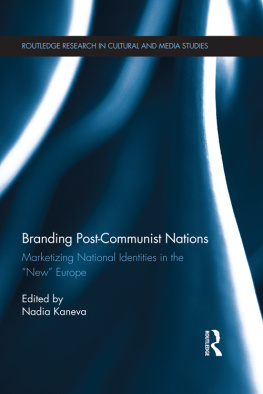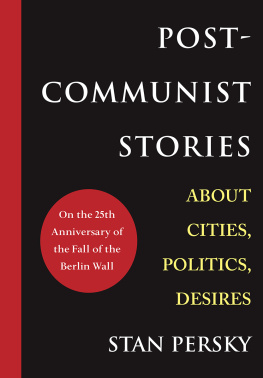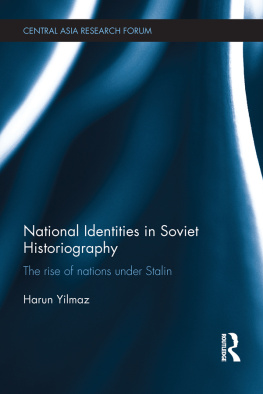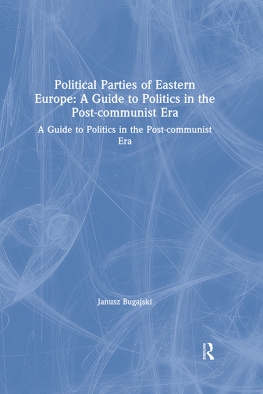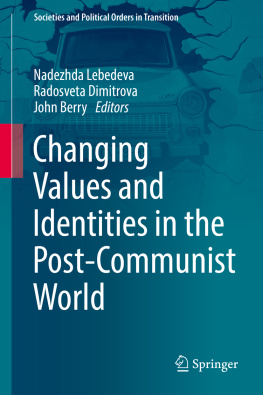Branding Post-Communist Nations
Routledge Research in Cultural and Media Studies
1 Video, War and the Diasporic Imagination
Dona Kolar-Panov
2 Reporting the Israeli-Arab Conflict
How Hegemony Works
Tamar Liebes
3 Karaoke Around the World
Global Technology, Local Singing
Edited by Toru Mitsui and Shuhei Hosokawa
4 News of the World
World Cultures Look at Television News
Edited by Klaus Bruhn Jensen
5 From Satellite to Single Market
New Communication Technology and European Public Service Television
Richard Collins
6 The Nationwide Television Studies
David Morley and Charlotte Bronsdon
7 The New Communications Landscape
Demystifying Media Globalization
Edited by Georgette Wang, Jan Servaes, and Anura Goonasekera
8 Media and Migration
Constructions of Mobility and Difference
Edited by Russel King and Nancy Wood
9 Media Reform
Democratizing the Media, Democratizing the State
Edited by Monroe E. Price, Beata Rozumilowicz, and Stefaan G. Verhulst
10 Political Communication in a New Era
Edited by Gadi Wolfsfeld and Philippe Maarek
11 Writers Houses and the Making of Memory
Edited by Harald Hendrix
12 Autism and Representation
Edited by Mark Osteen
13 American Icons
The Genesis of a National Visual Language
Benedikt Feldges
14 The Practice of Public Art
Edited by Cameron Cartiere and Shelly Willis
15 Film and Television After DVD
Edited by James Bennett and Tom Brown
16 The Places and Spaces of Fashion, 18002007
Edited by John Potvin
17 Communicating in the Third Space
Edited by Karin Ikas and Gerhard Wagner
18 Deconstruction After 9/11
Martin McQuillan
19 The Contemporary Comic Book Superhero
Edited by Angela Ndalianis
20 Mobile Technologies
From Telecommunications to Media
Edited by Gerard Goggin and Larissa Hjorth
21 Dynamics and Performativity of Imagination
The Image between the Visible and the Invisible
Edited by Bernd Huppauf and Christoph Wulf
22 Cities, Citizens, and Technologies
Urban Life and Postmodernity
Paula Geyh
23 Trauma and Media
Theories, Histories, and Images
Allen Meek
24 Letters, Postcards, Email
Technologies of Presence
Esther Milne
25 International Journalism and Democracy
Civic Engagement Models from Around the World
Edited by Angela Romano
26 Aesthetic Practices and Politics in Media, Music, and Art
Performing Migration
Edited by Roco G. Davis, Dorothea Fischer-Hornung, and Johanna C. Kardux
27 Violence, Visual Culture, and the Black Male Body
Cassandra Jackson
28 Cognitive Poetics and Cultural Memory
Russian Literary Mnemonics
Mikhail Gronas
29 Landscapes of Holocaust Postmemory
Brett Ashley Kaplan
30 Emotion, Genre, and Justice in Film and Television
E. Deidre Pribram
31 Audiobooks, Literature, and Sound Studies
Matthew Rubery
32 The Adaptation Industry
The Cultural Economy of Literary Adaptation
Simone Murray
33 Branding Post-Communist Nations
Marketizing National Identities in the New Europe
Edited by Nadia Kaneva
Branding Post-Communist Nations
Marketizing National Identities in the New Europe
Edited by Nadia Kaneva

First published 2012
by Routledge
711 Third Avenue, New York, NY 10017
Simultaneously published in the UK
by Routledge
2 Park Square, Milton Park, Abingdon, Oxon OX14 4RN
Routledge is an imprint of the Taylor & Francis Group, an informa business
2012 Taylor & Francis
The right of Nadia Kaneva to be identified as the author of the editorial material, and of the authors for their individual chapters, has been asserted in accordance with sections 77 and 78 of the Copyright, Designs and Patents Act 1988.
All rights reserved. No part of this book may be reprinted or reproduced or utilised in any form or by any electronic, mechanical, or other means, now known or hereafter invented, including photocopying and recording, or in any information storage or retrieval system, without permission in writing from the publishers.
Trademark Notice: Product or corporate names may be trademarks or registered trademarks, and are used only for identification and explanation without intent to infringe.
Library of Congress Cataloging-in-Publication Data
Branding post-communist nations : marketizing national identities in the new Europe / edited by Nadia Kaneva.
p. cm. (Routledge research in cultural and media studies ; 33)
Includes bibliographical references and index.
1. Political cultureEurope, Eastern. 2. NationalismEurope, Eastern. 3. Europe, EasternPolitics and government1989 I. Kaneva, Nadia.
JN96.A58B73 2011
306.20947dc22
2011004553
ISBN13: 978-0-415-88275-0 (hbk)
ISBN13: 978-0-203-80681-4 (ebk)
Contents
PART I
Promises and Problems of Post-Communist Nation Branding
NADIA KANEVA
GERALD SUSSMAN
ROBERT A. SAUNDERS
PART II
Agents, Institutions, Practices
SUE CURRY JANSEN
NADIA KANEVA
PAWE SUROWIEC
PART III
Representations, Mediations, Narrations
ZALA VOLI
ALICE BARDAN AND ANIK IMRE
LSZL KULCSR AND YOUNG-OK YUM
BRANISLAVA (BRANA) MIJATOVI
List of Figures
Preface
The chapters in this volume bring into focus the encounters of nation branding with post-communist Europe and document how the branded imagination has intervened in the national identity struggles of countries in the region. These investigations are intended as a contribution to the ongoing inquiry into the post-communist condition, as it is experienced through the mediations of nationhood and globalization.
My own interest in nation branding and post-communism stems from my personal experiences of growing up in a former communist country and working in the promotional industries before adopting my current role as a scholar and student of media, culture, and society. In many ways, this volume came about as a result of my enduring fascination with the rise of consumerism in the post-communist world and the changes in the fabric of social relations that it engenders. Many of the contributors to the volume also have personal biographies that connect them to Central and Eastern Europe; others are thoughtful external observers. All of them, however, share a critical interest in the regions transformations in the aftermath of Soviet communism.
The volume is structured in three parts, with Part I outlining a broad framework for critical investigations into the phenomenon of nation branding, and Parts II and III including seven country-specific studies. Chapter 1 is intended as a general introduction to the volume and lays out some of the overarching themes that emerge from the analyses in the other nine chapters.
In approaching the topic of nation branding, this collection aims to offer an alternative viewpoint to the one presented in writings by marketing and branding practitioners and academics. This volume sets out to outline the beginnings of a critique that relates nation branding to the rise of a neoliberal hegemony and a global promotional culture. Such critical work depends on the thoughtful engagement of scholars across disciplines and, for this reason, the volume includes a number of different approaches. Nevertheless, the following chapters offer partial accounts of a relatively new phenomenon and leave many questions unanswered. It is my hope that the volume will stimulate greater critical interest and invite future conversations on this topic.
Next page
